2024 Genesis G70 builds on its foundation, remains elegant

An autocross course at the first-drive event for the redesigned 2024 Genesis G70 highlights the dynamic strengths and weaknesses of the Korean sports sedan. New standard Brembo brakes (13.8-inch front discs with 4-piston calipers and 13.4-inch rear discs with 2-piston calipers) provide strong stopping power to keep the car on track for every corner to bring, and it quickly becomes clear that the new 2.5-liter turbo-4 is much more powerful than the 2.0-liter turbo-4 it replaces.
The car is athletic and fun to zip around this tight course, but the standard Michelin Primacy all-season tires and lack of a limited-slip differential make it difficult to throttle back the power out of the many tight corners. Then, when it locks on corner exit, it tends to understeer, causing me to either back off or wait until after the apex to accelerate. Summer performance tires would be better here, but they are only available with the top engine.

2024 Genesis G70
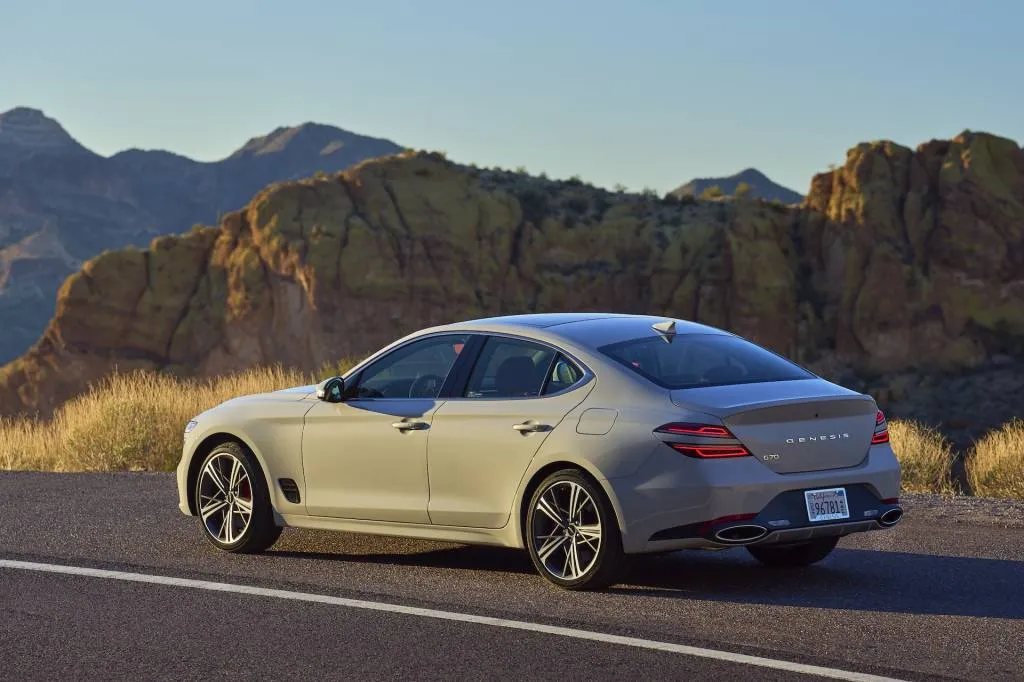
2024 Genesis G70
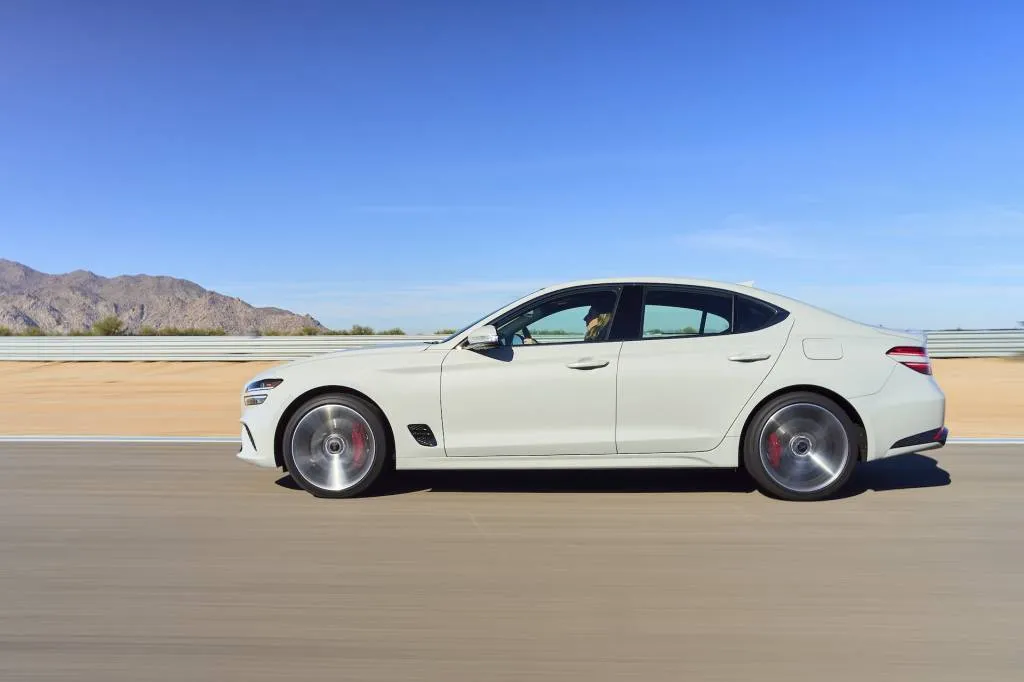
2024 Genesis G70
The biggest increases for 2024 come in the 2.5T base models. They swap a 252-hp 2.0-liter turbo-4 engine for a 2.5-liter turbo-4 engine with 300 hp and 311 lb-ft of torque. With an additional 48 hp and 51 lb-ft, it’s a much more powerful engine that’s more responsive across the entire rev range. It helps this car jump from corner to corner in autocross, and a previous road trip showed it makes overtaking on the highway a breeze. It’s also a fairly smooth engine, enabling a 0-60 mph sprint in just 5.5 seconds, according to Genesis. This is only possible with a launch control function that Genesis is reluctant to reveal. I think it’s a matter of switching to Sport+ mode and turning off the stability control, but the power is strong enough that I never bother trying it. Without launch control, expect 0-60 mph acceleration in about 6.0 seconds.
The turbo-4 and available twin-turbocharged 3.3-liter V6 are backed by an 8-speed automatic transmission. It shifts smoothly and responds faster depending on the mode. The G70 has Eco, Comfort, Sport, Sport+ and Custom modes. On the road, any mode works, although Sport+ can make the drivetrain feel a little too strained. However, on this autocross, Sport+ is essential for the laps I drive without using the steering wheel paddle shifters. It holds lower gears longer and downshifts faster to access more power. In a 24-second autocross, switching from Sport+ to Sport mode costs me 0.7 to 1.0 seconds.
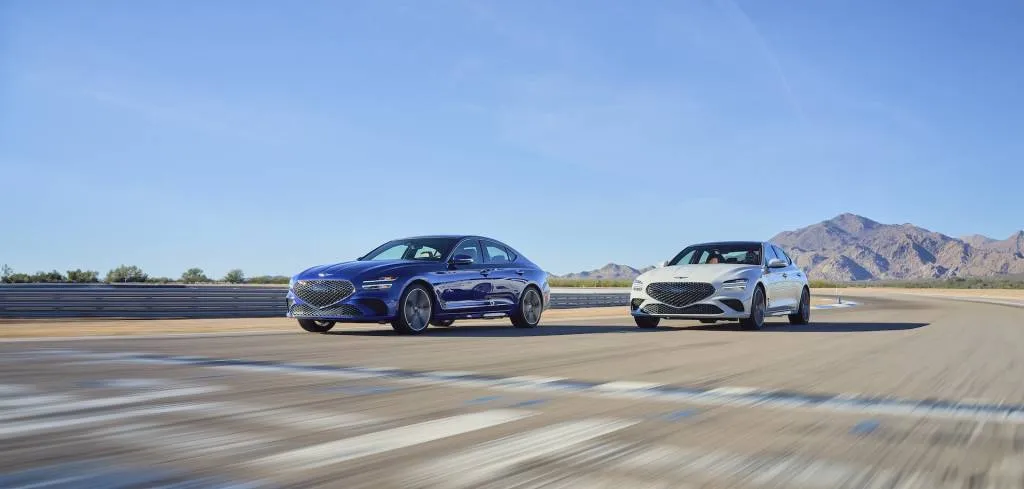
2024 Genesis G70
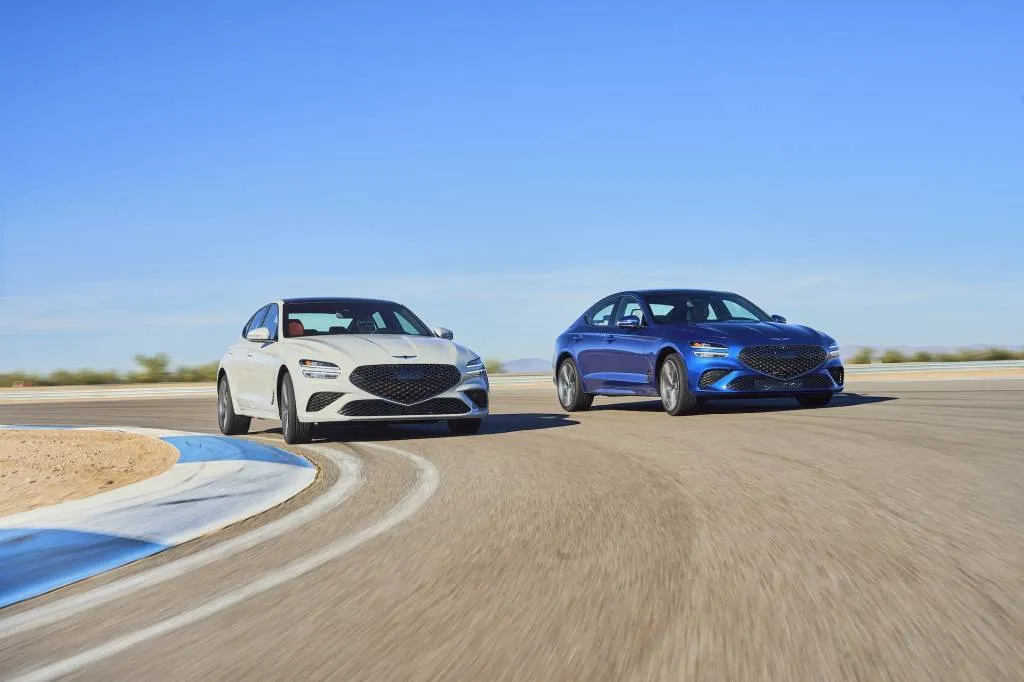
2024 Genesis G70
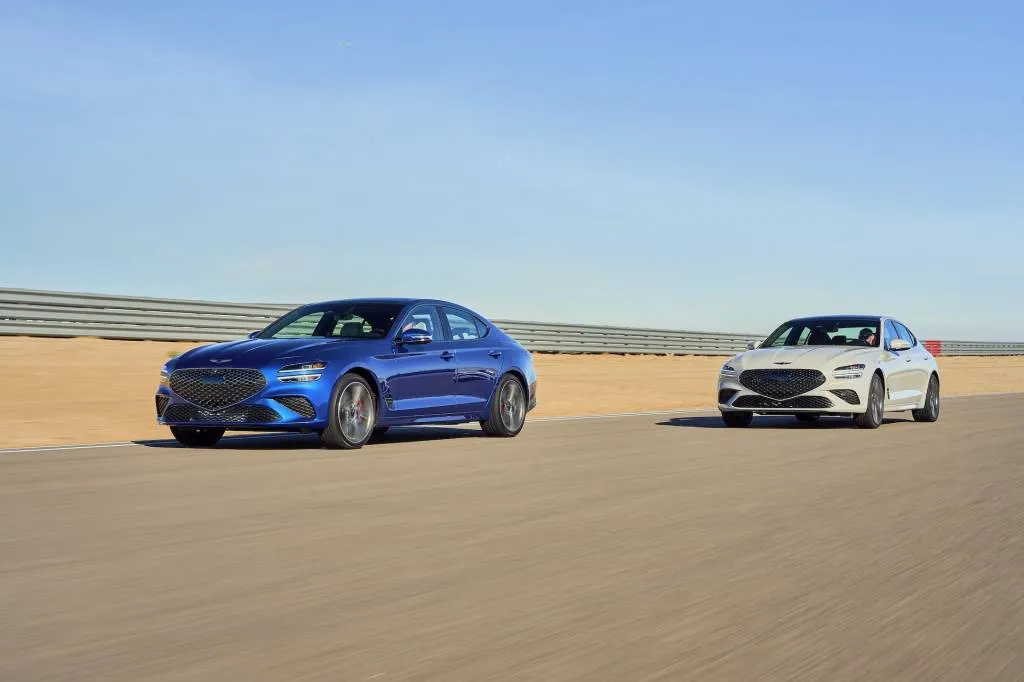
2024 Genesis G70
Genesis G70 chain drive
The autocross takes place in the parking lot of the Apex Motor Club in Maricopa, Arizona. A second, more intensive exercise consists of six laps of the track’s 2.27-mile road course in a rear-drive version of the top-of-the-line 3.3T Sport Prestige. It’s powered by a 3.3-liter twin-turbocharged V6 engine that boosts output to 365 hp and 376 lb-ft and enables acceleration from 0 to 60 mph in 4.5 seconds.
During my first three-lap session, I soon fell behind British touring car racer Howard Fuller in an identical G70. The good news from my perspective is that the three other journalists behind me are falling even further behind. One reason for this is certainly that Fuller is a better driver than us. After all, he’s a professional and I’m a budding superstar who’s better with words than lap times.
But the other reason is that I just don’t feel as comfortable on the long, sweeping corners of this track as I would, for example. a BMW 3 Series. This car’s Michelin Pilot Sport 4 summer performance tires provide good, but not great, grip, so the car is prone to skidding when driving close to the limit in tight corners. Handling is generally neutral mid-corner, but instead of ducking and lurching, the G70 tends to push to the outside of the corner as I utilize the V-6’s full 365 horsepower. This model’s standard locking differential on the rear axle makes it easier for the G70 to start, but causes the car to squat at the rear and rise at the front, resulting in understeer. This is despite the fact that the 3.3T Sport Prestige model comes with adjustable dampers that are at their stiffest setting.
During my second drive I gain more confidence in the car’s handling and find it easier to control it exiting corners by simply using less throttle. The new Brembo brakes also impress with strong stopping power and no fading, although Genesis has opted for metal-free brake pads to withstand the rigors of track use. That’s a small price to pay for useful route performance.
Understeer at the limit isn’t really that bad, as driving on a racetrack is a borderline scenario that few, if any, G70 buyers will experience. The G70 is a sports sedan, and although it wasn’t built as a race car, it’s still fast and fun on the track or street; The attitude of the best in class at the limit is simply missing.
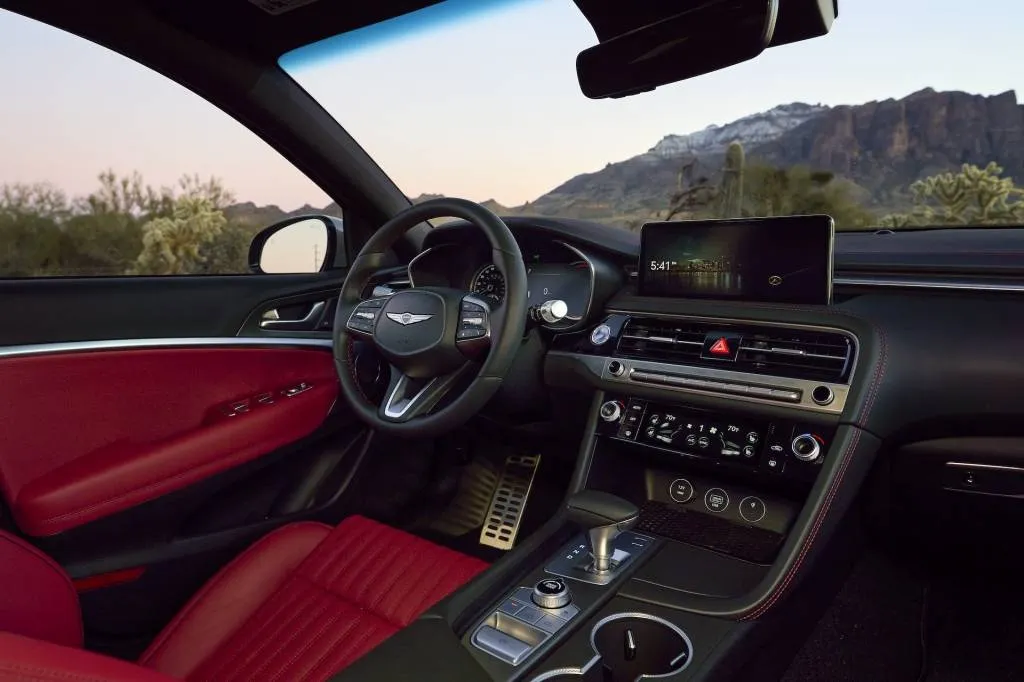
2024 Genesis G70
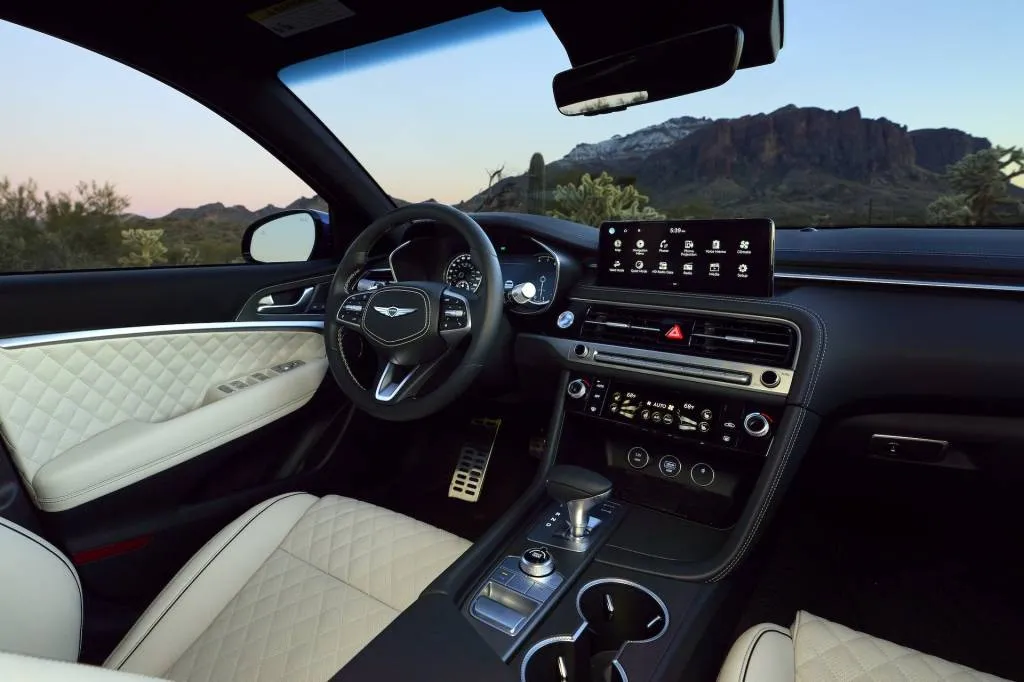
2024 Genesis G70
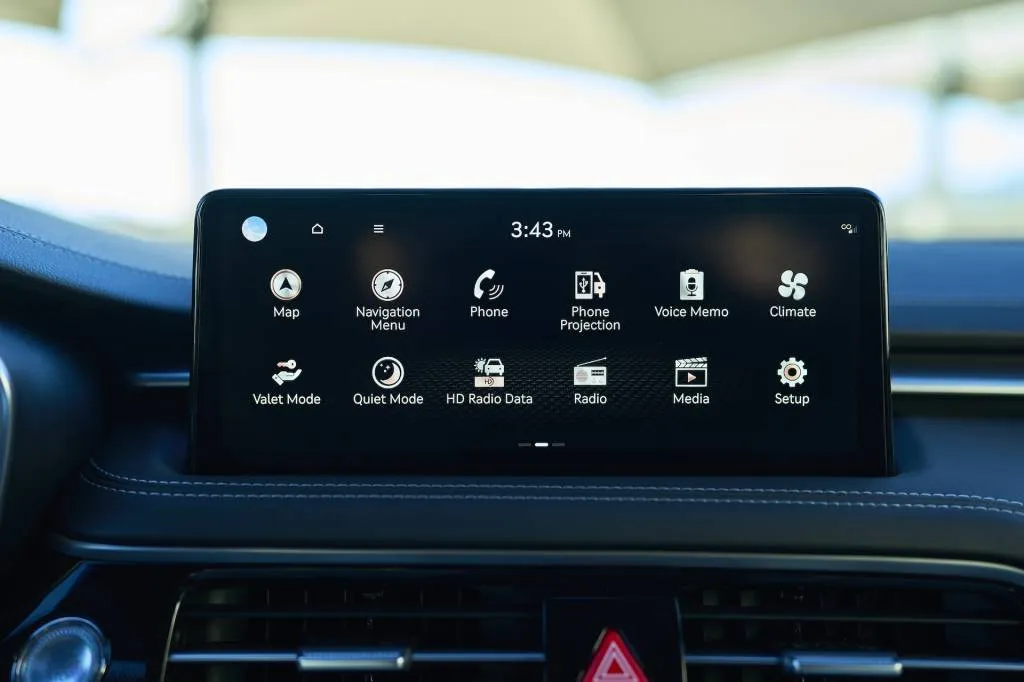
2024 Genesis G70
Genesis G70: Elegance is standard
A few road trips also demonstrate the G70’s qualities as a luxury sports sedan. It’s generally quiet, but both the Primacy and Pilot Sport 4 tires produce a noticeable noise on Arizona’s often rough paved roads. The steering has good grip and communicates well with what is happening with the tires. The low-profile tires and sporty suspension tuning give the car a ride that may be too firm for some buyers, particularly those in the Midwest who regularly drive on pockmarked roads.
The G70’s strength, which was not evident in any of the dynamic exercises, is its overall elegance. It’s noticeable just by looking at the car and especially when getting in. Every G70 looks distinctive, with a striking shield-shaped grille and stacked headlights set against a low and elegant sedan shape. Standard 19-inch wheels pushed into the curves, staggered tire sizes (225/40R19 at the front and 255/35R19 at the rear) and air outlets behind the front wheels illustrate the performance character of the vehicle.
Inside, things are even better: the base model has faux leather covering the seats, doors and dashboard, and the seat upholstery moves to genuine leather at the first level in the range, and Nappa leather on the top-of-the-line 3.3T Sport Prestige. Contrast stitching and diamond-stitch upholstery patterns add to the upscale feel, which is further enhanced by available red or white upholstery options. Versions with the V-6 also get a suede headliner, while every G70 features a clock-like analog speedometer combined with an 8.0-inch digital display that doubles as a tachometer, vehicle information display and blind spot camera display when the turn signal is in use . A 10.3-inch touchscreen for infotainment and a new touch-sensitive digital climate panel complete the interior.
The new 2.5 turbo makes the base model a better choice than last year. With a base price of $42,695 2024 G70 costs $2,180 more than a base 2023 model while also being about $3,000 less than a base model BMW 3 Series. All-wheel drive costs $2,100 more on each model, and the 3.3T starts at $51,145 in Sport Advanced trim, although we’ll shell out the extra $4,400 for the Sport Prestige’s adaptive dampers and limited-slip differential would take. Additionally, this trim features Nappa leather upholstery and synthetic suede headliner, a head-up display, a power trunk, a heated steering wheel, blind spot cameras and a surround-view camera system.
The Genesis G70 remains a luxury model with its 2024 update. While we prefer the top model’s additional power and performance features, the new base engine makes the G70 a much more fun, luxurious and sporty choice than the numerous compact SUVs that cost about the same. You also wouldn’t take these vehicles to an autocross or race track, and if you did, you’d fall much further behind Howard Fuller.
Genesis has covered Motor Authority’s travel, lodging and time expenses to bring you this first-hand report.
